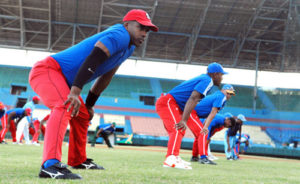Cuba was knocked out of the World Baseball Classic on Wednesday after losing 5-0 to Japan in San Diego’s Petco Park. The defeat was disappointing but not entirely surprising to fans, who had watched Japan rout Cuba 10-6 in the same venue during the finals of the Classic in 2006, and therefore had a sense of déjà vu in advance of this rematch.

Still, the loss is painful because of the solemn importance Cuba gives to the sport of baseball and to the national team. Cuban leaders state publicly that only the most honorable athletes are chosen as players—those that are faithful to their homeland and will represent it bravely against foreign teams. Players take the field with the psychological pressure of patriots that must defend their homeland. And on the streets of Havana, many people were hoping for a US-Cuba matchup in the finals of the Classic this year as a chance to beat the “imperialists.”
Clearly, baseball and the World Baseball Classic are more than just a game to many Cubans.
In fact, when the Cuban team returned to Havana today from San Diego, they were greeted on the airstrip by President Raúl Castro himself. And Fidel added to their star status with his two cents in a Granma op-ed this morning, which was reiterated to the team on the airstrip by Vice President Esteban Lazo. Fidel’s op-ed warned the team to take a lesson from the experience of defeat, and to learn from the Japanese team the disciplined art of training hard. He went on to criticize the Cuban team’s management, which includes his own son, Antonio Castro, who is the team’s doctor and the Vice President of the Cuban Baseball Federation.
His most interesting point was a very serious complaint that the organizers of the tournament had arranged the brackets to eliminate Cuba. Japan and South Korea are two of the best teams in the world, he said, and both were bound to make it to the semifinals; Cuba was slated to play one or the other before that round; therefore, the bracket planners were ensuring that Cuba would not make it to the semifinals, and certainly not to the finals. Fidel argued, “What was important to the organizers was eliminating Cuba, a revolutionary country that has heroically resisted and has not been defeated in the battle of ideas. Nonetheless, we will one day become a dominant force in this sport.”
Statements by the President, the former president and the upper echelons of the Cuban regime have effectively changed baseball from a sport into a political and patriotic battle.